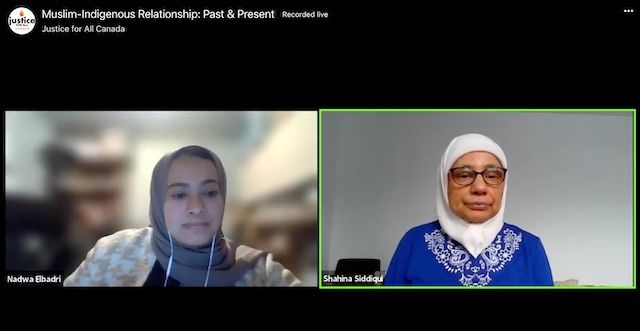Forum addresses Muslim Indigenous Relationships

“When you respect, respect is given; when you hold back, it is held back,” Shahina Siddiqui, a well-known Canadian Muslim leader, told participants during an online forum on Muslim Indigenous relationship held on Sunday, November 14th.
“That has been the relationship between Indigenous peoples and Muslims of Canada - we have been holding back because of many reasons,” Siddiqui added. “We can have no reconciliation without being willing to listen to the truth and the truth is difficult and painful to listen to.”
“The relationship between Muslim women and Indigenous women is so important because in both our traditions, we are the backbone of our communities,” she noted.
The public forum was organized by Muslim Indigenous Connect (MIC), a project that was recently launched to engage Muslim youths to build trusting relationships with Indigenous communities.

Imam Osman and his co-facilitators, Imam Noman Tarek and Taha Ghayyur, started the MIC initiative as they felt the need to raise awareness about Indigenous peoples in the Muslim community.
“This will be a youth-oriented first step in a continuing journey in Muslim-Indigenous dialogue,” said Imam Irshad Osman. “The program aims to introduce Muslim youths to Indigenous history, culture, spirituality, and values.”

Last Sunday’s public forum brought together a panel of Muslim leaders that included Shahina Siddiqui, Dawood Zwink, Memona Hossain, Asma Maryam Ali and Muneeb Nasir to discuss the current state of Muslim Indigenous relationships.
“The goal is to do some hard looking inwards, highlighting some of the progress already being done in the space of Indigenous Muslim relationships and to build on that foundational relationship,” said moderator Nadwa Elbadri during her introductory remarks. “As part of the Muslim Indigenous Connect (MIC) program, we have onboarded 25 Muslim students equipping them with the knowledge and skills for dialogue and building relationships that are rooted in Islamic principles of justice, compassion and goodwill and of reconciliation while also giving them the opportunity to hear from Indigenous Elders and to learn about the beliefs and values of Indigenous communities.”
Muneeb Nasir told the virtual gathering that much more education about Indigenous peoples is needed in Muslim communities.
“Education is needed to overcome the systemic anti-Indigenous bias and racism that is prevalent in the society and which also finds expression in new settler communities such as the Muslim communities,” he said. ‘As Justice Murray Sinclair, the Chair of the Truth and Reconciliation Commission advised, ‘Education got us into this mess and education will get us out of it.’
